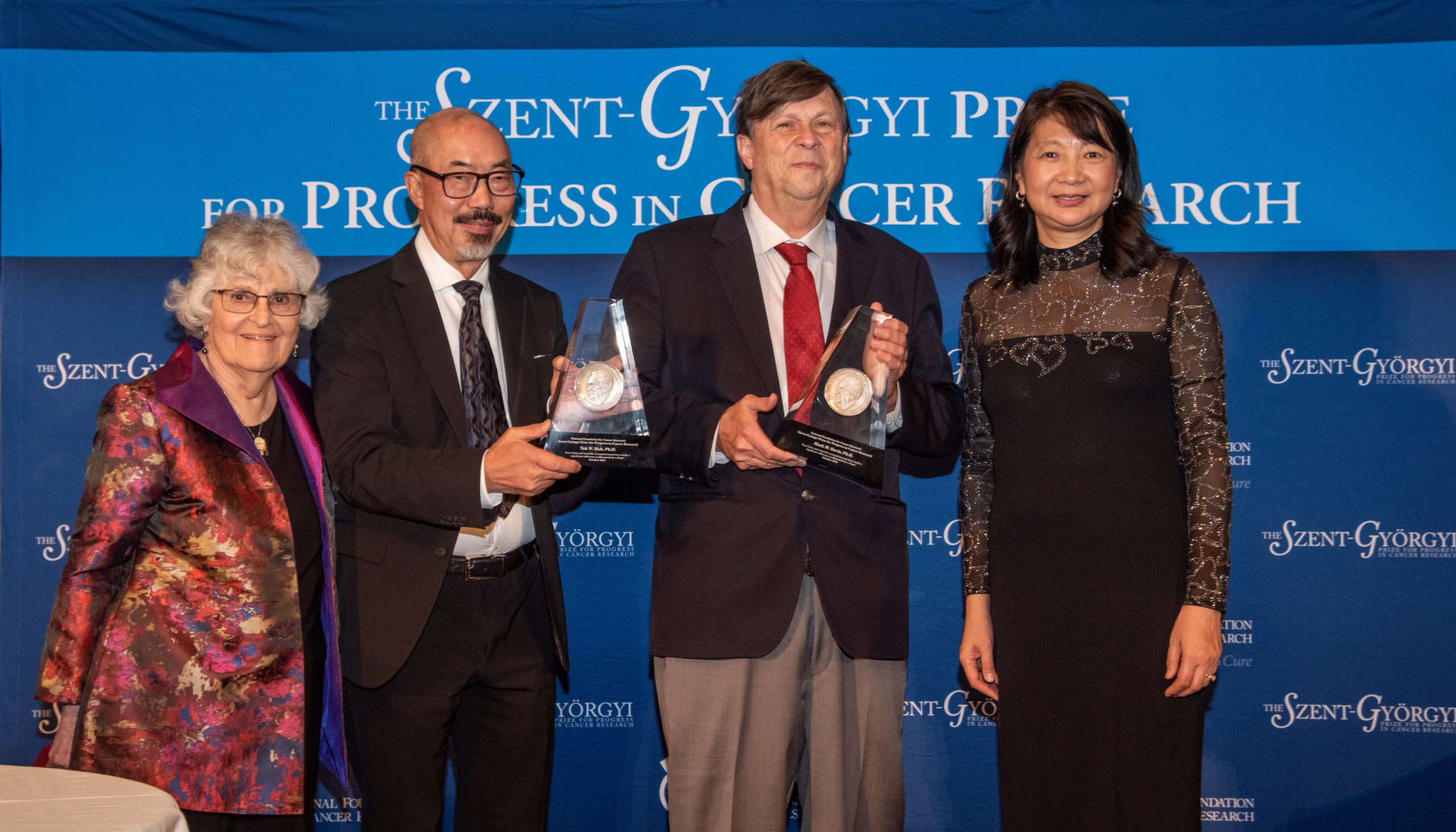Event Recap: 2021 Annual Conference – October 30

A Day to Celebrate Cancer Research Progress & Entrepreneurship
On October 30, 2021, at the National Press Club in Washington, DC, the National Foundation for Cancer Research held its first hybrid scientific event. In-person attendees and our virtual audience via live-streaming heard from world-renowned leaders about their latest life-saving discoveries for today’s and tomorrow’s cancer patients and the future directions of their research.
This event brought together experts to share successful approaches or findings that can benefit the scientific community and inspire collaborations that can help accelerate discoveries for cancer patients.
For patients or those impacted by cancer, the sessions provided a look into what goes into the research process and what discoveries are emerging.
The day consisted of three exciting informational sessions:
- Think Tank Forum on Translational Cancer Research & Investments in Oncology
- Luncheon & Fireside Chat on Women’s Leadership, Entrepreneurship & Mentorship in Life Sciences
- Dinner & Award Ceremony for Szent-Györgyi Prize for Progress in Cancer Research
“It was just great: inspiring, challenging, and yet hopeful. In short, perfect!”
-Web Cavenee, Chair of NFCR’s Scientific Board
“Thanks so much to everyone involved and to NFCR for making it possible for us to get together. I am grateful to be included!”
– Monica Bertagnolli, M.D., Professor, Surgery, Harvard Medical School
Praise for the event was positive, and NFCR plans to follow a similar structure for future Annual Conferences. Learn more here.
Visit our event page to find more details about our 2021 Event and see all of the speakers involved.
Some Key Highlights from the Days’ Events
Preventing Cancer and Improving Treatment for Patients
The critical topics of the keynote address by Dr. Doug Lowy, Principle Deputy Director, National Cancer Institute, set the stage for the day’s discussions.

You can help accelerate these treatments too!
“I am actually optimistic over time that the liquid biopsy test will be clinically beneficial–not just because we will improve the sensitivity and specificity for the liquid biopsy technology–but also because it will go hand in hand with the anticipated improvement in cancer treatments.” – Dr. Lowy.
Dr. Lowy predicted it might soon be feasible to end HPV-associated cancer worldwide if the newest vaccine in current clinical trials provides strong protection. As a co-developer of the vaccine for cervical cancer due to HPV (human papillomavirus), his words carry significant merit.
Immunotherapy – State of the Art and Future Trends
Immune Checkpoint Inhibitors (ICIs) unleash the natural brake on our immune system. ICIs can provide long-term survival in several cancer types. Outstanding research was presented on improving this immunotherapy for more patients and giving them hope for life.
New Way to Give Immunotherapy Saves More Lives

She shared promising results from her current research where patients with deadly Merkel cell skin cancer receive ICIs via a different approach—for four weeks prior to their surgery.
“After ICI therapy, about 50% of patients had no cancer cells and this predicts their survival at two years after surgery,” remarked Dr. Topalian!
Dr. Topalian is developing new therapies to improve the outcome of more patients and save their lives.
Breakthrough on Immunotherapy Resistance

The loss of a specific “p” region of Chromosome 9 and neighboring genes will trigger a “switch” that changes the surrounding microenvironment causing the cancer cells to become resistant to ICI therapy.
To the benefit of patients, a clinical test has just been developed to identify HNC patients whose tumors have these gene deletions and are unlikely to respond to ICIs.
Precious months of their survival time will be saved instead of lost on ineffective and costly agents with possible immune-related side effects.
Other researchers have now confirmed and extended these 9p gene-deletion findings to several other cancer types.
“Our findings of a way to predict a patient’s response or resistance to ICI will help fill a major unmet clinical need, and we are now working hard to develop this predictive test into a new therapeutic and potentially preventive, approach,” said Dr. Lippman.
Szent-Györgyi Prize for Progress in Cancer Research
After the symposium, attendees enjoyed an evening award ceremony for the prestigious Prize named in honor of NFCR cofounder and Nobel Laureate Dr. Albert Szent-Györgyi. The Prize honors outstanding scientists for their seminal discoveries that have had a lasting impact on cancer, holding the promise of improving or saving lives.
2020 Prize Winner, Dr. Susan Band Horwitz of Albert Einstein College of Medicine, pioneered how Taxol and other natural product drugs work and how drug resistance occurs. Her work on Taxol led to its U.S. Food and Drug Administration (FDA) approval, and it has treated a million breast, ovarian, lung, and pancreatic cancer patients worldwide!
2021 Prize Co-Winners, Dr. Tak Mak of Princess Margaret Cancer Centre and University of Toronto and Dr. Mark Morris Davis of Stanford School of Medicine, discovered the structure of the immune T-cell receptor and pioneered T-cell research. Their breakthroughs paved the path to life-saving immunotherapies—such as FDA-approved CAR-T-cell therapies for blood cancers!
Special Thanks
NFCR wants to extend its sincerest gratitude to all speakers, sponsors, and supporters who participated in this event. You can watch all sessions from our 2021 Annual Conference on-demand on our new digital community, the Oncology Metaverse, here.
You can also view more photos from this event here and on the Oncology Metaverse.











